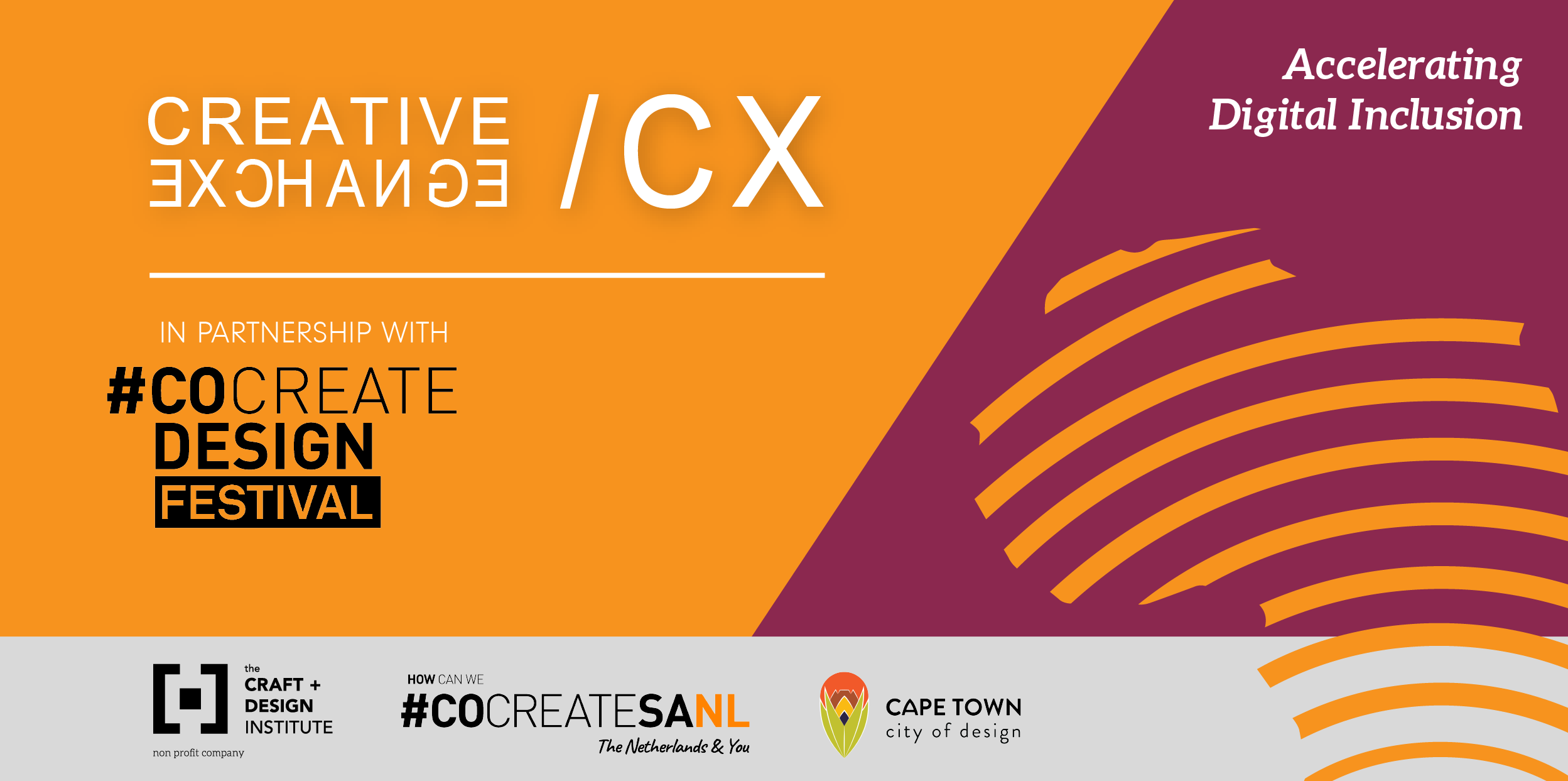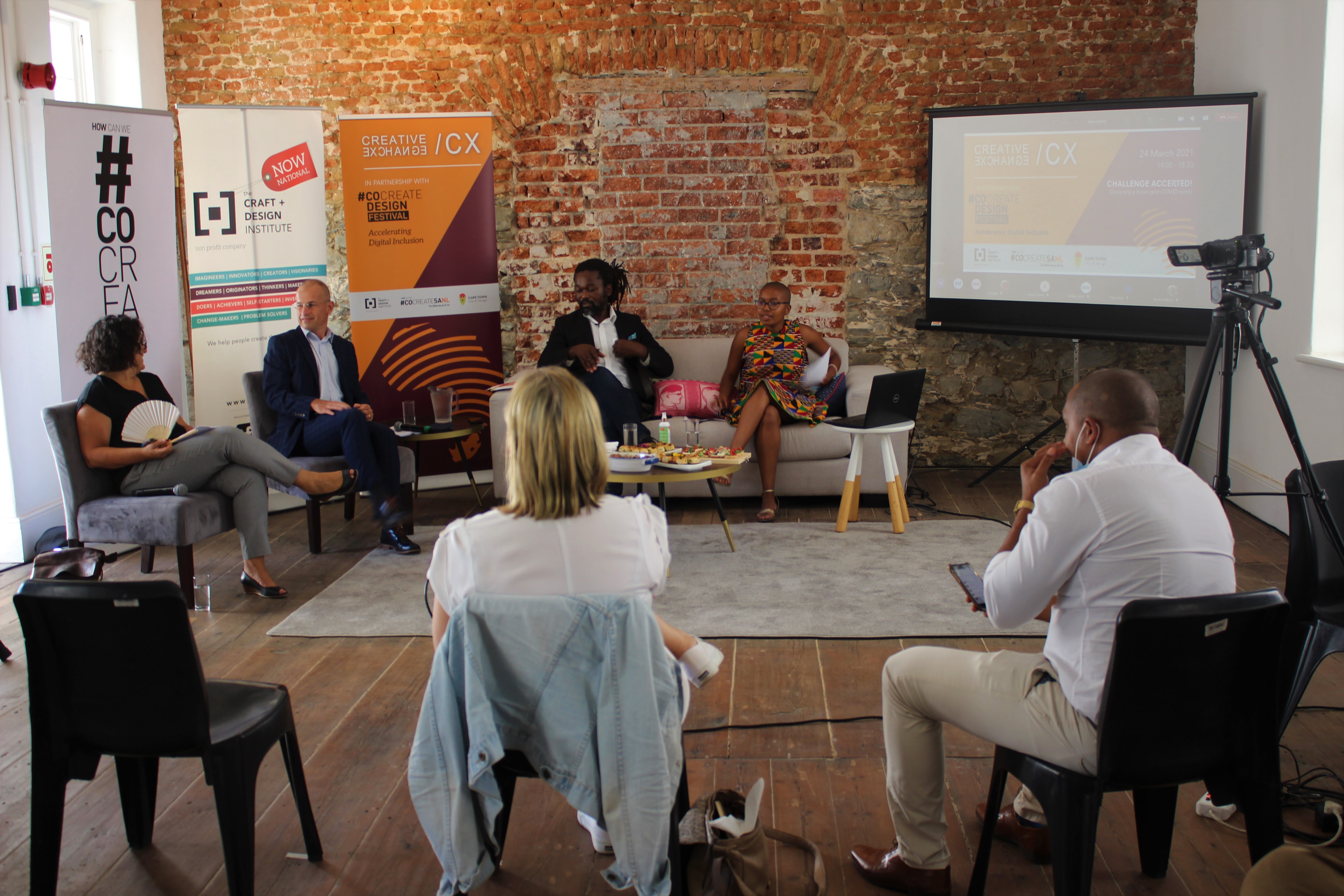
Amidst the economic and social struggles which have been compounded by the global pandemic, the Craft + Design Institute (CDI) and the Kingdom of the Netherlands in South Africa (#cocreateSANL), hosted the first in a series of monthly events to share knowledge and ideas on how to deal with some of our biggest COVID-19 related challenges.
The Creative Exchange is an event series which CDI has run for the past 20 years. In 2021, it builds on the #cocreateDESIGN FESTIVAL, which the CDI and Netherlands Consulate General in Cape Town have hosted since 2018. The Creative Exchange continues the Festival theme of 2020, which centred on the 4th Industrial Revolution, the use of design thinking, and digitally-enabled solutions. The March event, themed Designing a brave post-COVID world, explored the current context and what’s needed to overcome our challenges.
Guiding the discussion was our MC for the event, broadcast host Africa Melane, who expertly wove together the threads of knowledge and the dialogue.
Mapping the economic fault lines
Opening the March event was Dr Basani Baloyi, the Climate, Energy and Infrastructure Programme Lead at the Institute for Economic Justice. She identified three main lows being faced in the country: “low investment, low employment, and low productivity.”
“Our public sector investments have declined substantially over time, whilst private sector investments have tended to be short-term in nature. And our economy is highly reliant on mining and mineral related manufacturing industries and it’s highly capital intensive – these sectors are more inclined to employing more machines than labour. When investments are made, they are mostly made in these industries which do not employ too many people – too often we see investment within sectors where there is a strong concentration as well as monopoly control that is quite exclusionary.”
“To add to this, is budget austerity. State budget cuts means that there has been inadequate investment in social goods such as healthcare, education and social security. These challenges are made even worse by poor governance and corruption – so that when investments are mobilised for social good, it’s highly inefficient and there are a range of leakages.”
Dr Baloyi outlined that we had an economy that had already entered a recessionary phase pre-COVID – where unemployment had worsened from 28% to about 32%, (more broadly speaking it is around 40%). “This is a scenario which made us vulnerable to a crisis, and also shapes the extent to which we can be resilient in crisis,” she said.
Pressures on healthcare, governance concerns Dr Baloyi spoke of the pressures facing the healthcare sector, adding that South Africa has a highly dichotomised health-care system consisting of a public sector that struggles to provide the investment or governance necessary to provide adequate healthcare for all, while a “well-resourced” private sector supports the minority. “These inequalities are also demonstrated in the resource distribution where the private healthcare system has double the ventilators and nearly triple the existing debt capacity than in the public healthcare sector.” She said that COVID-19 has only worsened a situation that was already bad and therefore it is critical to ask what has government’s response been. “What has to be critical is that government has to implement well the investment that it has committed – giving us some kind of reprieve. There’s R500bilion and only a third of it has been spent. My key take away is can we please spend what we said we would, at the very least, to move the economy, and within that to sort out issues of governance.” We need an enabling environment for innovation Our second speaker, S'onqoba Vuba, is the co-founder and MD of the SME implementation consultancy Perpetu8 and is also the COO of 10X Accelerator. She has served as a Commissioner on the South African Presidential Commission on 4IR (4th Industrial Revolution). Vuba called on government to ensure that the relevant infrastructure is in place to move us in the right direction.
She pointed out that role of government is to create an enabling environment for everyone to get on with doing what they need to do; and for government to ensure that it’s done in a way that drives equality, and effectively drives us towards the economic and social goals we’re after. She said that, in an increasingly technological world, we need government to be reviewing policy and legislation to ensure that innovations that are happening are done in the public interest. One of the areas she raised as an example, is access to data, such as during the pandemic. “Government needs to actually make certain data sets available in order to enable innovation,” she said. Through having and sharing this detailed data, such as on COVID and its impact, it not only enables certain innovations in the healthcare sector, but also allows organisations to be able to respond to realities on the ground.
Figuring it out together – the path to designing innovative solutions Vuba added there is reason for optimism, highlighting some “green shoots” that could be nurtured. “Just in the past year there are so many shoots of innovation in South Africa that are actually needed globally,” she said.
One example is the healthcare innovation in response to the pandemic. “Along came COVID-19 and in many ways our healthcare sector had to operate as one – whether public or private. Collaborations were done that had never been done before; we’ve seen some positive outcomes.” Vuba also mentioned innovations such as the advent of Telemedicine – a concept spoken of in South Africa, but which laws do not yet appropriately enable. She encouraged collaborative efforts and added that the commission (the SA Presidential 4IR Commission) was a good example of what happens when you bring together the public and private sectors, civil society, labour unions and academia, for a conversation. “The reality is that the world we live in now is not one where silos are successful. Instead, it is a world where collaboration makes us successful – where multi-disciplinary teams make us successful. Where we all don’t necessarily know what is going to happen tomorrow, but we need to effectively figure it out together.” Creative Exchange as a moment of reflection
Erica Elk, CEO of the CDI, said that while looking at the challenges in the country, it can appear overwhelming just reading the headlines, but that through sharing experiences and ideas, we can begin to see that “green shoots” are indeed possible.
“The Creative Exchange, in many respects, is about breaking silos, sharing knowledge and giving South Africans a diversity of perspectives which then can spark thinking and dialogue on new solutions. Having spaces for some reflection in the midst of crisis is needed, and, can be powerful.” In his closing remarks, Sebastiaan Messerschmidt, Consul General at the Netherlands Consulate General in Cape Town, thanked the speakers for their insights. He reflected that, when hearing the discussions, particularly regarding new solutions emerging, it was encouraging to hear examples inspired by design-thinking and using people’s on-the-ground experiences as the starting point for ideas. “And that’s exactly what we need to build on for resilience.”

|